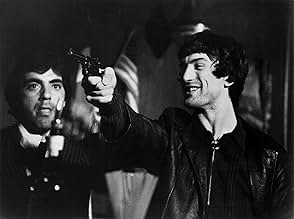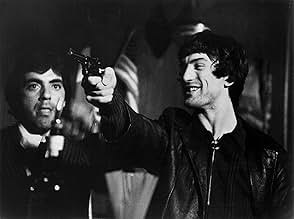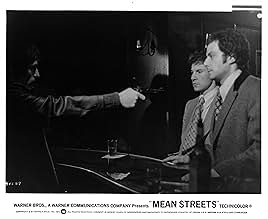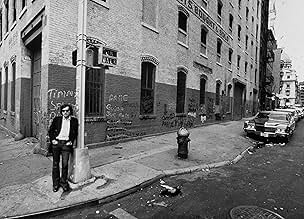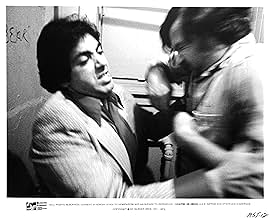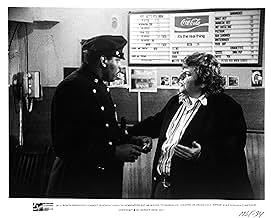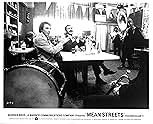एक छोटा सा हुड अपने दोस्त जॉनी और जॉनी के लेनदारों के बीच शांति बनाए रखने की कोशिश करता है।एक छोटा सा हुड अपने दोस्त जॉनी और जॉनी के लेनदारों के बीच शांति बनाए रखने की कोशिश करता है।एक छोटा सा हुड अपने दोस्त जॉनी और जॉनी के लेनदारों के बीच शांति बनाए रखने की कोशिश करता है।
- पुरस्कार
- 5 जीत और कुल 5 नामांकन
Victor Argo
- Mario
- (as Vic Argo, Victor Argo)
Murray Moston
- Oscar
- (as Murray Mosten)
फ़ीचर्ड समीक्षाएं
Like the Irishman long after it, Mean Streets is a gangster film that hones in on the mundanity of it all. The violence is pretty nasty when it happens but for the most part, focusing on the everyday life of these low level gangsters and their struggles in recognisably Scorsese fashion is this film's greatest strength.
Harvey Keitel leads the film with an inner turmoil that's great to witness. Overall, it's a very restrained performance which works so well since he's repressing all of his troubles. Seeing Robert De Niro in a role like this really shows how far he's come as this volatile and juvenile performance is almost unrecognizably him.
As director, co-writer and co-editor, Martin Scorsese has a fully formed vision. His usual themes are present, the editing mostly has the rhythm of his later work and New York is definitely a character in itself. Another signature trait of his work are the needle drops and there's a terrific selection of them on display in this.
Harvey Keitel leads the film with an inner turmoil that's great to witness. Overall, it's a very restrained performance which works so well since he's repressing all of his troubles. Seeing Robert De Niro in a role like this really shows how far he's come as this volatile and juvenile performance is almost unrecognizably him.
As director, co-writer and co-editor, Martin Scorsese has a fully formed vision. His usual themes are present, the editing mostly has the rhythm of his later work and New York is definitely a character in itself. Another signature trait of his work are the needle drops and there's a terrific selection of them on display in this.
Mean Streets has all the characteristics we have come to associate with Scorsese - the fluid camerawork, the expressionistic lighting, the sudden explosions of violence, the eclectic soundtrack. In later films, he took cinema to new heights with the flowering of his technical skills and the broadening of his material, but Mean Streets remains unsurpassed for the emotional intensity which only a young director, passionate about film and intent on making a personal statement, could achieve.
The theme of the film is contained in the famous first line 'You don't make up for your sins in church; you do it in the streets' (a Scorsese voice-over). An extended preface which delineates the nature of the film and its characters before the narrative begins includes brief cameo scenes introducing the four protagonists (a much copied device: see, for example, Trainspotting).
Scorsese's alter-ego is played as in the earlier 'Who's That Knocking At My Door?' by Harvey Keitel, giving the performance of his young life. He is Charlie, a junior member of a Mafia family who collects debts and runs numbers, but who also has aspirations to sainthood. The other key figure is his anarchic friend, Johnny Boy, played with ferocious energy by de Niro.
Charlie is introduced coming out of confession, dissatisfied with his penance. Reciting words doesn't mean anything to him and he can't believe that forgiveness could come so easily. Deliberately burning his hand in a candle flame is a more effective reminder of the pain of hell. The camera follows Charlie from the altar into Tony's bar, a red-lit inferno, and when Johnny Boy comes in, to the tune of Jumping Jack Flash, Charlie recognises that this is the form his penance will take. Johnny Boy is the cross he must bear. 'You send me this, Lord' he says resignedly.
Johnny Boy's irresponsibility and impulsiveness make him everything Charlie, with his controlled, anxious, guilt-ridden persona, is not. The argument which follows in the back room about Johnny Boy's debts deserves its reputation as one of the great scenes in seventies cinema.
Charlie's life moves in well worn, claustrophobic circles. Hardly anyone outside his immediate circle appears in the film and other ethnic groups are viewed with suspicion. The characters seldom appear outdoors or in daylight. Charlie inhabits a world of bars, pool halls and cinemas. In the one scene he appears in sunlight, he looks ill at ease. The suit and heavy overcoat he wears (reflecting his Mafiosi ambitions) look distinctly out of place on a beach. It's significant that in this scene Teresa, his girlfriend, scorns his small-time gangsterism and challenges him to join her in moving away to a new life. But Charlie is trapped by his desire to please his uncle.
Scorsese has said that his choice in adolescence lay between becoming a priest and becoming a gangster and that he failed on both counts. Mean Streets allows him to explore that choice to devastating effect.
The theme of the film is contained in the famous first line 'You don't make up for your sins in church; you do it in the streets' (a Scorsese voice-over). An extended preface which delineates the nature of the film and its characters before the narrative begins includes brief cameo scenes introducing the four protagonists (a much copied device: see, for example, Trainspotting).
Scorsese's alter-ego is played as in the earlier 'Who's That Knocking At My Door?' by Harvey Keitel, giving the performance of his young life. He is Charlie, a junior member of a Mafia family who collects debts and runs numbers, but who also has aspirations to sainthood. The other key figure is his anarchic friend, Johnny Boy, played with ferocious energy by de Niro.
Charlie is introduced coming out of confession, dissatisfied with his penance. Reciting words doesn't mean anything to him and he can't believe that forgiveness could come so easily. Deliberately burning his hand in a candle flame is a more effective reminder of the pain of hell. The camera follows Charlie from the altar into Tony's bar, a red-lit inferno, and when Johnny Boy comes in, to the tune of Jumping Jack Flash, Charlie recognises that this is the form his penance will take. Johnny Boy is the cross he must bear. 'You send me this, Lord' he says resignedly.
Johnny Boy's irresponsibility and impulsiveness make him everything Charlie, with his controlled, anxious, guilt-ridden persona, is not. The argument which follows in the back room about Johnny Boy's debts deserves its reputation as one of the great scenes in seventies cinema.
Charlie's life moves in well worn, claustrophobic circles. Hardly anyone outside his immediate circle appears in the film and other ethnic groups are viewed with suspicion. The characters seldom appear outdoors or in daylight. Charlie inhabits a world of bars, pool halls and cinemas. In the one scene he appears in sunlight, he looks ill at ease. The suit and heavy overcoat he wears (reflecting his Mafiosi ambitions) look distinctly out of place on a beach. It's significant that in this scene Teresa, his girlfriend, scorns his small-time gangsterism and challenges him to join her in moving away to a new life. But Charlie is trapped by his desire to please his uncle.
Scorsese has said that his choice in adolescence lay between becoming a priest and becoming a gangster and that he failed on both counts. Mean Streets allows him to explore that choice to devastating effect.
Both Robert De Niro and Harvey Keitel are fantastic in Mean streets. I'm not a huge Robert De Niro fan as every time i see him act, i just think to myself that he Robert De Niro trying to be somebody. This is not the case in mean Streets for me. Instead he plays a kid who is young and stupid named Johnny boy. His performance is brilliant and is most likely one of his best. Keitel plays Charlie who looks out for Johhny. The opening line of the film basically tells you everything you would want to know about Charlie.
The film is gritty and shot in a documentary style with several tracking shots being carried out hand held. It takes the film 45 minutes to give you a clear plot and a clear understanding on what going to unfold. The last 20 minutes is directed perfectly with a palpable sense of suspense and is clearly the best ending you can give to this film. One negative would be that in the first half there literally no set pieces . Not a lot happens but saying this you get a clear understanding and fully engaged with the characters which makes the last 20 minutes outstanding.
It not the best film that Scorese has ever made but it clear by watching this that Mean Streets was his main starting point to his successful career
The film is gritty and shot in a documentary style with several tracking shots being carried out hand held. It takes the film 45 minutes to give you a clear plot and a clear understanding on what going to unfold. The last 20 minutes is directed perfectly with a palpable sense of suspense and is clearly the best ending you can give to this film. One negative would be that in the first half there literally no set pieces . Not a lot happens but saying this you get a clear understanding and fully engaged with the characters which makes the last 20 minutes outstanding.
It not the best film that Scorese has ever made but it clear by watching this that Mean Streets was his main starting point to his successful career
I was never clear at just why Harvey Keitel was putting himself out on a limb for Robert DeNiro in Mean Streets. Sure he's taken with DeNiro's cousin Amy Robinson still I'm not sure he was worth the effort.
Keitel is a small time hood in Manhattan's Little Italy who's not really into it. DeNiro is another small time hood but he's completely and psychotically out of control. He's borrowed a few grand from local loan shark Robert Romanus and Romanus wants his money. Now during the climax scene DeNiro does ask a relevant question, why after he has borrowed and stiffed everyone in the neighborhood would you lend him any money?
In fact Keitel is all that's standing between DeNiro and gangster retribution. Is it all worth it even for Amy Robinson who is an epileptic and for some reason Keitel's uncle Cesare Danova thinks that disqualifies her as a potential bride.
The story is a bit muddled but the characters especially Keitel and DeNiro are unforgettable. Mean Streets made the career of both of them and of director Martin Scorsese. Keitel has become a valued character player and DeNiro a star with an astonishing variety of roles. In fact next to John Ford/John Wayne, Martin Scorsese/Robert DeNiro is probably the most successful director/player combination in film history.
This must have been a labor of love since Martin Scorsese grew up in Little Italy grown a lot smaller since he was a kid there. No doubt Keitel, DeNiro and the rest are drawn from characters he knew. His mom Catherine Scorsese also makes an appearance as she does in many of her son's works.
I don't think Mean Streets ranks up there with Casino, The Departed, The Aviator and Goodfellas, but it's an interesting work.
Keitel is a small time hood in Manhattan's Little Italy who's not really into it. DeNiro is another small time hood but he's completely and psychotically out of control. He's borrowed a few grand from local loan shark Robert Romanus and Romanus wants his money. Now during the climax scene DeNiro does ask a relevant question, why after he has borrowed and stiffed everyone in the neighborhood would you lend him any money?
In fact Keitel is all that's standing between DeNiro and gangster retribution. Is it all worth it even for Amy Robinson who is an epileptic and for some reason Keitel's uncle Cesare Danova thinks that disqualifies her as a potential bride.
The story is a bit muddled but the characters especially Keitel and DeNiro are unforgettable. Mean Streets made the career of both of them and of director Martin Scorsese. Keitel has become a valued character player and DeNiro a star with an astonishing variety of roles. In fact next to John Ford/John Wayne, Martin Scorsese/Robert DeNiro is probably the most successful director/player combination in film history.
This must have been a labor of love since Martin Scorsese grew up in Little Italy grown a lot smaller since he was a kid there. No doubt Keitel, DeNiro and the rest are drawn from characters he knew. His mom Catherine Scorsese also makes an appearance as she does in many of her son's works.
I don't think Mean Streets ranks up there with Casino, The Departed, The Aviator and Goodfellas, but it's an interesting work.
Charlie may be small time but the authority and standing of his Uncle Giovanni in the community of Little Italy offers him the chance to become more than just a local hustler. One of the things he should be careful of is the company he keeps and who he stands with. Unfortunately Charlie is very protective of his cousin Johnny Boy, who seems determined to borrow as much money as possible, gamble it away and not pay it back and also in a relationship with Johnny's relation Teresa. While the fun and energy of the street life continues, dark consequences of all these things threaten Charlie and those around him.
It has been years since I saw this film and I noticed that I had last watched it before I started reviewing. As a result I watched it again yesterday to refresh my memory. Seeing it with older eyes is an impressive experience because I appreciate what Scorsese has gone on to do and found it fascinating to look back on this, one of his earliest films. The plot is a mash of characters and events that come together to create a sense of place that is convincingly done; the overall narrative focuses on Charlie, in particular where his relationships are taking him but this aspect ebbs and flows with the events. It is funny, violent, personal and engaging, only a few aspects come over as weak. The script flows like real dialogue, producing the different moods of each scene and also being memorable and rough.
The style and direction of the film are impressive and it is interesting to see the influence Scorsese had with this and his other films. The techniques employed here will ring bells with anyone who watches modern cinema and television with more than a passing interest, Sopranos in particular owes him a debt. Here we have the slow-motions, chest-mounted camera (I'm sure there is a proper name for it), impressive use of music and so on that we have come to be used to with Scorsese and one cannot help be impressed by how well developed these ideas were at an early stage in his career. Of course along with stylistic constants, several of the cast would become regulars. Keitel is the heart of the film for me and, although his opportunities in the script are surprisingly limited, I felt he did well with the themes handed to him. De Niro of course catches the eye more because of what was to come but also because he has the more energetic character. Robinson didn't make much of an impression on me but the support cast features early turns from faces such as Proval, Romanus, Argo and others.
Mean Streets might be a bit rough and ready when placed next to the polished films that Scorsese would go on to do but it does not take away from its strengths to look back at it. So much of Scorsese's style and calling cards are in place even at this early stage and his film convincingly creates the streets and characters of the place. The main players involved have done better films since this one but it is still strong, stylish and interesting and definitely worth a look for anyone who has since any other Scorsese films.
It has been years since I saw this film and I noticed that I had last watched it before I started reviewing. As a result I watched it again yesterday to refresh my memory. Seeing it with older eyes is an impressive experience because I appreciate what Scorsese has gone on to do and found it fascinating to look back on this, one of his earliest films. The plot is a mash of characters and events that come together to create a sense of place that is convincingly done; the overall narrative focuses on Charlie, in particular where his relationships are taking him but this aspect ebbs and flows with the events. It is funny, violent, personal and engaging, only a few aspects come over as weak. The script flows like real dialogue, producing the different moods of each scene and also being memorable and rough.
The style and direction of the film are impressive and it is interesting to see the influence Scorsese had with this and his other films. The techniques employed here will ring bells with anyone who watches modern cinema and television with more than a passing interest, Sopranos in particular owes him a debt. Here we have the slow-motions, chest-mounted camera (I'm sure there is a proper name for it), impressive use of music and so on that we have come to be used to with Scorsese and one cannot help be impressed by how well developed these ideas were at an early stage in his career. Of course along with stylistic constants, several of the cast would become regulars. Keitel is the heart of the film for me and, although his opportunities in the script are surprisingly limited, I felt he did well with the themes handed to him. De Niro of course catches the eye more because of what was to come but also because he has the more energetic character. Robinson didn't make much of an impression on me but the support cast features early turns from faces such as Proval, Romanus, Argo and others.
Mean Streets might be a bit rough and ready when placed next to the polished films that Scorsese would go on to do but it does not take away from its strengths to look back at it. So much of Scorsese's style and calling cards are in place even at this early stage and his film convincingly creates the streets and characters of the place. The main players involved have done better films since this one but it is still strong, stylish and interesting and definitely worth a look for anyone who has since any other Scorsese films.
What Scorsese Film Ranks Highest on IMDb?
What Scorsese Film Ranks Highest on IMDb?
Cinema legend Martin Scorsese has directed some of the most acclaimed films of all time. See how IMDb users rank all of his feature films as director.
क्या आपको पता है
- ट्रिवियाFrancis Ford Coppola contributed money to the budget of the film. However, it is rumored that he lent Martin Scorsese $3000 as the Mafia shook him down for using the San Genaro Festival as a backdrop without "permission". It's generally presumed the Mafia uses the all-cash festival to launder money from their ill-gotten gains.
- गूफ़You can see Robert De Niro's mic pack on his back when he gets up to walk to the window at Charlie's house after staying the night.
- भाव
[first lines]
Voice in Charlie's Mind: You don't make up for your sins in church. You do it in the streets. You do it at home. The rest is bullshit, and you know it.
- इसके अलावा अन्य वर्जनNBC edited 10 minutes from this film for its 1977 network television premiere.
- कनेक्शनEdited into American Cinema: Film Noir (1995)
- साउंडट्रैकJumpin' Jack Flash
Written by Mick Jagger (as M. Jagger), Keith Richards (as K. Richards) (uncredited)
By The Rolling Stones
Courtesy of ABKCO Records
टॉप पसंद
रेटिंग देने के लिए साइन-इन करें और वैयक्तिकृत सुझावों के लिए वॉचलिस्ट करें
- How long is Mean Streets?Alexa द्वारा संचालित
विवरण
- रिलीज़ की तारीख़
- कंट्री ऑफ़ ओरिजिन
- आधिकारिक साइट
- भाषाएं
- इस रूप में भी जाना जाता है
- Calles peligrosas
- फ़िल्माने की जगहें
- उत्पादन कंपनियां
- IMDbPro पर और कंपनी क्रेडिट देखें
बॉक्स ऑफ़िस
- बजट
- $5,00,000(अनुमानित)
- US और कनाडा में सकल
- $32,645
- US और कनाडा में पहले सप्ताह में कुल कमाई
- $32,645
- 15 मार्च 1998
- दुनिया भर में सकल
- $61,676
- चलने की अवधि1 घंटा 52 मिनट
- रंग
- पक्ष अनुपात
- 1.85 : 1
इस पेज में योगदान दें
किसी बदलाव का सुझाव दें या अनुपलब्ध कॉन्टेंट जोड़ें






